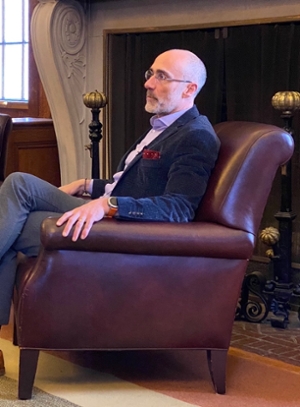Fear, Love, and the Need for (Civilized) Argument
By Tom Porter and Rebecca Goldfine“I’m almost positive I am wrong on many things,” said Arthur Brooks. “The problem is, I don’t know which things.” Brooks, who is Bowdoin's first Joseph McKeen Visiting Fellow, was speaking at a public event on Friday, March 4, concluding a three-day to visit to campus.
Regarded as a leading intellectual voice on the center right, Brooks was for ten years president of the Washington, DC-based American Enterprise Institute, a leading conservative think tank. He is now William Henry Bloomberg Professor of the Practice of Public Leadership at Harvard Kennedy School and professor of management practice at Harvard Business School. He is the author of eleven books, including Love Your Enemies: How Decent People Can Save America from the Culture of Contempt (2019), which debuted as a national bestseller.
The quote above was in response to a question from an audience member about what Brooks remains unsure about today. “I’m constantly trying to interrogate my political beliefs and question them,” he said, “but I can’t do that unless I’m surrounded by people who disagree with me.” The problem we have today, Brooks continued, is that disagreeing with people has become so hard. “It’s become like a mano a mano struggle, like a wrestling match.” When you’re not sure about something (“and you shouldn’t be sure,” he said), the ideal situation is to discuss the issue, but reasoned argument has become harder in today’s politically polarized environment—and it should not be: “You’re not denying my identity just because you don’t share my political beliefs,” said Brooks.

Friday’s event, which was moderated by Assistant Dean of Student Affairs for Inclusion and Diversity Eduardo Pazos, who is also director of the Rachel Lord Center for Religious and Spiritual Life, was called “Faith, Leadership, and Political Change—Exploring the Role that Faith Communities Have in Creating Meaningful Change in America.”
When asked about the contribution of faith communities and how some members of those communities have taken part in polarizing behavior (by supporting the January 6, 2021, Capitol riots for example), Brooks, a devout Roman Catholic, responded that all people are imperfect, including those of faith. “My faith is the most important thing in my life, but I’m not going to fool myself into thinking that the Roman Catholic church, which I love, is not conducted by imperfect people with ‘feet of clay.’” The Catholic Church, he said, has struggled a lot due to human frailty, referencing the church’s many sexual abuse scandals involving priests. People who share your faith may do things and say things you disagree with, Brooks continued, but this should never shake your faith.
Brooks also talked about the importance of hope and described how his faith gives him the strength to reject hatred and face the future with hope and courage. “Hatred is a by-product, and an expression of fear,” he stressed. We have a choice when confronted with opposing viewpoints, he added. We can choose hatred or courage. “Courage leads to love, whereas hatred leads to entrenched conflict and a lack of progress. You can only persuade people with courage and love.”
A lot of the unpleasantness in the culture and politics of today, said Brooks, is due to the fact that young people have been turned into “child soldiers in our culture war” by older generations, “being told they should hate someone for being on the other side of the political divide.” Nevertheless, Brooks said he had “huge hope” that young people will one day reject this polarization.
“Courage leads to love, whereas hatred leads to entrenched conflict and a lack of progress. You can only persuade people with courage and love.”
Keynote Address
In his Wednesday night talk on March 2, “Life and Love after COVID-19,” Brooks said the pandemic—and the fear, loneliness, and grief that many experienced during it—offers people a chance, counterintuitively perhaps, to become happier.
While many have heard of post-traumatic stress syndrome, Brooks said psychologists also speak about “post-traumatic growth.” “Even little traumas can lead to huge growth,” he said.
The pandemic and its lockdowns revealed how crucial social contact is. And social media is no substitute, Brooks warned. “We need to be more intensely in contact with one another,” he said. Specifically, he prescribed more eye contact and touch—a “twenty-two second hug every two hours” with someone you love. (And making eye contact with a dog counts!)
Yet people tend to turn away from what they need during times of stress. Our “lizard brain,” or amygdala, kicks in, and we are likely to shrink back into avoidance, isolation, and rumination. As an antidote, Brooks—a practicing Roman Catholic who studies Buddhism—said we can help ourselves by adopting the Buddhist practice of metacognition, or mindfulness, which is observing yourself from some remove.
“Thinking about the feelings you’re having moves them from the limbic system to the frontal cortex of your brain, where they’re not managing you, you’re managing them,” he said.
In conclusion, he reiterated that times of change and uncertainty—which come barreling into all of our lives whether we want them to or not—offer up great opportunity. “The only choice we have is how to react: learn, grow, or not,” he said. “We have an opportunity as a nation to love each other more and understand each other.”
Outside of these community-focused engagements, Brooks also took time to meet with Bowdoin Public Service students, attend classes, and to help kick off a new Bowdoin Intergroup Dialogue program on politics.